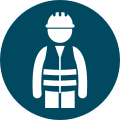
Our vision:
A safe and healthy Kitsap County for all.
Storms & Flooding
Storms can cause power outages, flooding, sewage pollution, and other hazards.
Learn how to safely use generators, keep food safe to eat, make water safe to drink, and take care of your septic system during a storm.
By being prepared, you can protect yourself and your loved ones.

Click here to view current air quality if graphic does not load.
Checking Air Quality
For current air quality conditions in Kitsap County, go to:
For updates on wildfire activity and smoke forecasts, visit the Washington Smoke Information blog
Health Hazards
For information on how to stay safe and healthy during some of the most likely hazards we see or will likely experience in Kitsap County, check out the links below.
Visit the Kitsap County Department of Emergency Management website to learn more about local disaster preparedness and sign up for alerts. More resources are available at Ready.gov.
Generator Use During a Power Outage
Incorrect generator use can lead to carbon monoxide poisoning, electric shock, or fire.
Follow directions supplied with the generator carefully.
Don't overload your generator.
Generators and fuel should always be used outdoors and at least 20 feet away from windows, doors and attached garages. Using these appliances inside can cause carbon monoxide poisoning and death.
Install working carbon monoxide detectors on every level of your home. Carbon monoxide is a colorless, odorless gas that can kill you, your family and pets.
Keep the generator dry and protected from rain or flooding. Touching a wet generator or devices connected to one can cause electrical shock.
Always connect the generator to appliances with heavy-duty extension cords.
Let the generator cool before refueling. Fuel spilled on hot engine parts can ignite.
Food Safety During a Power Outage
If the power has gone out:
Use a thermometer to check the temperature of foods in your refrigerator and freezer. Refrigerated foods should be 41°F or colder and frozen foods should be 0°F or colder.
Keep refrigerator and freezer doors closed to conserve cold air or keep food cold with ice or dry ice. During a power outage, a full freezer will hold its temperature for about 48 hours or about 24 hours if it is half-full. A refrigerator will keep food safe for about 4 hours.
If you plan to eat refrigerated or frozen meat, poultry, fish, or eggs while they are still at safe temperatures, cook them thoroughly to ensure any harmful bacteria are destroyed.
When in doubt, throw it out! Never taste food to "test" if it's safe. The following foods should be discarded if you aren't sure:
Meat, poultry, or seafood products
Soft cheeses and shredded cheeses
Milk, cream, yogurt, and other dairy products
Opened baby formula
Eggs and egg products
Dough and cooked pasta
Cooked or cut produce
After the power is back on, allow time for the refrigerator and freezer to reach cold temperatures (refrigerator: 41°F or below, freezer: 0°F or below) before restocking.
Drinking Water Safety and Disinfection
Store one gallon of water per person, per day to be prepared for storms and emergencies. Don't forget to store water for your pets.
Public water systems: If there is flooding, local authorities or water system operators may recommend using only bottled, boiled, or disinfected water until regular water service is restored.
Private wells and small water systems: If your drinking water well is flooded, assume the water in your home is polluted. We recommend using bottled water that has been stored for less than six months in tightly sealed containers, or taking steps to disinfect well water (see steps below). Wells may require disinfection if flooded.
Purifying by Boiling
If your tap water is unsafe, boiling is the best method to kill organisms that cause illness.
Cloudy water should be filtered before boiling. Use coffee filters, paper towels, cheesecloth or a cotton plug in a funnel.
Bring the water to a rolling boil for at least one minute.
Let the water cool before drinking.
Add two drops of household bleach per gallon to maintain water quality while in storage.
Purifying with Bleach
Treat water by adding liquid household bleach.
Household bleach is typically between 5.25% and 8.25% chlorine. Read the label.
Avoid using bleaches that contain perfumes, dyes and other additives. Be sure to read the label.
Cloudy water should be filtered before adding bleach.
Place the water in a clean container. Add 1/4 teaspoon of bleach to one gallon of water, or one teaspoon of bleach to five gallons of water.
Mix thoroughly and let stand for at least one hour before drinking.
Onsite Sewage (Septic Systems)
Septic systems may not operate properly if soil in the drainfield area becomes saturated or is flooded. If your drainfield is very wet or under water, reduce indoor water use to prevent the system from failing.
Overusing a septic system while the drainfield is flooded may cause sewage to back up into the house or rise to the surface in your drainfield area.
During extreme wet weather, follow simple steps to protect your septic system and property:
Spread out water use during the day and week to even out water flow to the drainfield.
Reduce water use by refraining to use the washing machine, cut back on toilet flushes, and reduce bathing.
Identify and repair all leaky plumbing fixtures. A running toilet or a leaky faucet can discharge many gallons of extra water each day to the drainfield.
Identify and repair all leaky septic tanks, risers, etc.
Divert all surface waters and downspouts away from the septic system.
Power outages can cause septic systems to not work properly. Many septic systems use an electric pump to move sewage. If your system has a pump and the power is out, reduce water use as much as possible to avoid overloading your system. Consider having a secondary power source, such as a generator, to keep your system running.
Dealing with Floodwater
Floodwater often carries pollution that can make you sick. Remember to:
Avoid direct contact with floodwater and wear protective equipment when working around floodwater.
Wash your hands with soap and clean water before preparing or eating food, or after handling contaminated items.
Discard all food that has come in contact with floodwater. Canned food is safe to use, but disinfect cans by wiping them with bleach water before use.
Do not drive through floodwater. Even a foot of water is enough to sweep away your car.
More Resources
Sign up for KitsapALERT
Inclement Weather Alerts | Kitsap County
Severe Weather | CDC
Data: Air Quality & Asthma Visits to Kitsap Emergency Departments

Data: Heat Extremes in Kitsap County

Data: Precipitation in Kitsap County

Data: Temperature & Heat-related Visits to Emergency Departments

Data: Temperature and Cold-related Visits to Kitsap Emergency Departments











.png)
